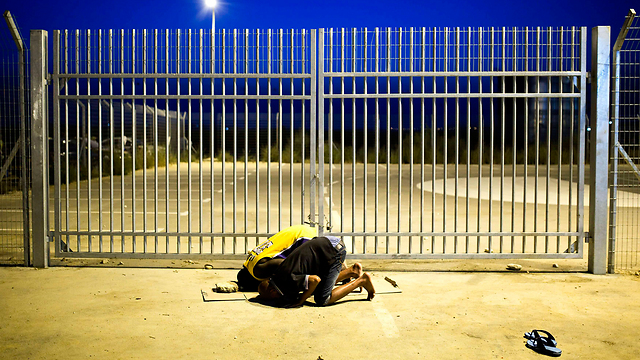
Stormy debate on migrants law at Knesset
Interior Minister Sa'ar says illegal immigration is a 'lurking danger' at contentious Internal Affairs Committee session on asylum seeker policy.
"We must not accept the High Court's decision as final, Israeli society cannot absorb the infiltrators," said Interior Minister Gideon Sa'ar on Monday at an Internal Affairs Committee hearing on the government's policy on African asylum seekers, some two weeks after the court struck down several amendments in the Infiltration Prevention Act.
During the hearing, Sa'ar said that "whoever thinks the phenomenon of illegal immigration into Israel is behind us is wrong. It is a lurking danger because there is one fundamental figure that will not change – Israel is a Western state with a high quality of life."
He highlighted the difference between Israel and its neighbors as a cause for the trend. "We are surrounded by impoverished nations. What will happen if our legislation does not provide a solution?"
On Sunday evening, Israeli lawmakers and legal officials convened to discuss the controversial legislation, after the High Court of Justice ruled that the 'open' detention facility used to house a large number of Israel's asylum seeker community must be closed within 90 days.
It was the second time the court ruled that the law infringed on asylum seekers' basic rights, as stipulated by Israel's Basic Laws – laws with near constitutional status – and thus the government members convened for the third time to overcome legal issues posed by the bill and its accompanying Holot detention center.
Holot was originally constructed along with a Knesset decision to detain asylum seekers at the complex indefinitely until their asylum requests would be reviewed. The facility was considered "open" meaning that detainees were allowed to leave, but had to report back every few hours – no small task in light of the center's location at the heart of the Negev desert, with limited public transportation.
The court then shot down the open-ended holding of asylum seekers, and the Knesset passed amendments that would keep African asylum seekers off the streets for a year – but that too failed the pass the court's scrutiny.
According to the judges, the arrangement disproportionately harms the constitutional right to freedom set forth in the Basic Law: Human Dignity and Liberty.
Now officials from the Interior Ministry are working circumnavigate the issue, hoping if the length of detention was lowered to 10-months, the court would let the law stand.
An official source within the Justice Ministry said that the chances of that passing the court were slim, and said that the number should be lowered to six months.
Attorney General Yehuda Weinstein and outgoing Interior Minister Gideon Sa'ar attended the meeting at the ministry, as did Weinstein's deputy – Dina Zilber – and his advisor for criminal matters, Raz Nizri. Sa'ar proposed a variety of approaches to the legal experts, but no specific formulation was adopted.
Those in attendance decided to emphasize the judicial oversight initiative by the state, in accordance with the High Court ruling; every person summoned to the detention facility will be given the opportunity to officially seek asylum – at their request.
It was also decided to cancel the decree ordering those staying at the facility to present attendance in the afternoon hours – an issue which the court criticized in its ruling.
Omri Efraim contributed to this report.












